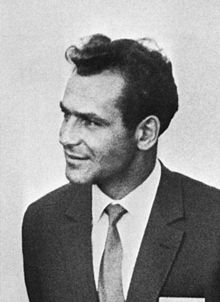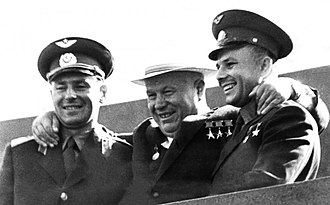Gherman Titov: Difference between revisions
ClueBot NG (talk | contribs) m Reverting possible vandalism by 199.212.252.130 to version by 202.55.194.10. False positive? Report it. Thanks, ClueBot NG. (1818188) (Bot) |
No edit summary |
||
| Line 139: | Line 139: | ||
[[Category:Cardiovascular disease deaths in Russia]] |
[[Category:Cardiovascular disease deaths in Russia]] |
||
[[Category:Burials at Novodevichy Cemetery]] |
[[Category:Burials at Novodevichy Cemetery]] |
||
so yay potatoes |
|||
Revision as of 17:16, 2 May 2014
Gherman Stepanovich Titov | |
|---|---|
 | |
| Born | 11 September 1935 |
| Died | 20 September 2000 (aged 65) |
| Nationality | Russian |
| Occupation | Pilot |
| Awards | |
| Space career | |
| Cosmonaut | |
| Rank | General-Colonel, Soviet Air Force |
Time in space | 1d 01h 18m |
| Selection | Air Force Group 1 |
| Missions | Vostok 2 |
Mission insignia | File:Vostok-2 mission patch.jpg |
Gherman Stepanovich Titov (Template:Lang-ru; 11 September 1935 – 20 September 2000) was a Soviet cosmonaut who, on 6 August 1961,[1] became the second human to orbit the Earth, aboard Vostok 2, preceded by Yuri Gagarin on Vostok 1. He was the fourth person in space, counting suborbital voyages of US astronauts Alan Shepard and Gus Grissom.
Titov's flight finally proved that humans could live and work in space. He was the first person to orbit the Earth multiple times (a total of 17), to spend more than a day in space, to sleep in orbit and to suffer from space sickness. In fact, he also holds the record for being the first person to vomit in space.[2] He was the first to pilot a spaceship personally and he made the first manual photographs from orbit, thus setting a record for modern space photography. He also was the first person to film the Earth using, for ten minutes, a professional quality Konvas-Avtomat movie camera.[3][4] A month short of 26 years old at launch, he remains the youngest person to fly in space.[5]
In his subsequent life Titov continued to work for the Soviet space program, playing a major role in Spiral project where he trained to become the first pilot of an orbital spaceplane. However, after the death of Yuri Gagarin in a military aircraft accident in 1968 the Soviet government decided it couldn't afford to lose its second cosmonaut, and so Titov's career as test pilot ended.
Titov served in the Soviet Air Force and become General-Colonel, and in his final years in post-Soviet Russia he became a Communist politician. Despite having been chosen only second after Gagarin to fly into space, it was Titov who later proposed the Soviet Government regularly celebrate Cosmonautics Day on April 12, the day of Gagarin's flight.
Biography
Titov was born in the village of Verkhneye Zhilino in the Altai Krai and went to school at the Stalingrad Military Aviation School. After graduating as an air force pilot, he was selected for cosmonaut training in 1960.
Titov flew the Vostok 2 mission launched on 6 August 1961. It lasted for 25.3 hours and he performed 17 orbits of the earth. His call sign was Eagle (Template:Lang-ru). He landed close to the town of Krasny Kut in Saratov Oblast, Russia. A month short of 26 years old at launch, he remains the youngest person to fly in space.[6][7] Titov was a member of the Communist Party of the Soviet Union, as were almost all the Soviet cosmonauts.
Titov was a fine sportsman, and keen on gymnastics:
- "Service in the Air Force made us strong, both physically and morally. All of us cosmonauts took up sports and PT seriously when we served in the Air Force. I know that Yuri Gagarin was fond of ice hockey. He liked to play goal keeper. Gherman Titov was a gymnastics enthusiast, Andran Nikolayev liked skiing, Pavel Popovich went in for weight lifting. I don't think I am wrong when I say that sports became a fixture in the life of the cosmonauts."[8]
He was the first person to suffer from "space sickness" (motion sickness in space) and was also the first person to sleep in space. He slept for roughly one orbit and was surprised to wake with his arms floating in the air due to the absence of normal gravity. He returned to sleep after putting his arms under a security belt, then slept 30 minutes more than predicted by the flight plan. He stated that "Once you have your arms and legs arranged properly, space sleep is fine ... I slept like a baby".[9]
Following his space flight, Titov assumed various senior positions in the Soviet space programme until his retirement in 1992. In 1995, he was elected to the State Duma as a member of the Communist Party. He died of cardiac arrest in his sauna at the age of 65 in Moscow. He was buried in the Novodevichy Cemetery.
Awards and legacy

Gherman Titov was awarded the title Hero of the Soviet Union, two Orders of Lenin, and numerous medals and foreign orders. He was bestowed the title of the Hero of Socialist Labor of Bulgaria, Hero of Labour of Vietnam, and Hero of Mongolia. Titov crater on the far side of the moon and an island in Halong Bay are named after him, Ti Tốp Island.
On 6 August 2011, the 50th anniversary of Titov's flight, the reconstructed and expanded Gherman Titov Museum was opened in his native village of Polkovnikovo, Altai Krai.[10]
Titov in fiction
In Arthur C. Clarke's 2010: Odyssey Two (and the film adaptation 2010), the opening scene features a conversation between Dimitri Moisevitch of the Soviet Space Council and Dr. Heywood Floyd. When Moisevitch informs Floyd that the Soviets will be travelling to Jupiter on their new spaceship the Cosmonaut Alexei Leonov, Floyd is initially puzzled, claiming that he thought the ship was to be named after Gherman Titov. In the book, Moisevitch just mentioned that it had been changed to Leonov; in the film, he replies that Titov has fallen out of favour, though he does not elaborate.
BBC Radio 4's Afternoon Play on 12 April 2011, Titanium, features Titov as narrator during the training and flight of Yuri Gagarin. It was part of a week to celebrate the 50 anniversary of Gagarin's flight.
Honours and awards

- Russia and the USSR
- Hero of the Soviet Union (9 August 1961)
- Order of Merit for the Fatherland, 3rd class (7 September 1995) – for services to the state, achievements in work and significant contribution to strengthening friendship and cooperation between peoples
- Two Orders of Lenin (17 June and 9 August 1961)
- Order of the October Revolution (21 February 1985)
- Order of the Red Banner of Labour (15 January 1976)
- Lenin Prize (1988)
- Medal "For the Development of Virgin Lands" (August 1961)
- Honoured specialist of the Armed Forces of the USSR (15 August 1991) – for outstanding service to the Soviet state in the country's defence capacity and professional skill
- Honoured Master of Sports (1961)
- Pilot-cosmonaut of the Soviet Union
- Foreign awards
- Hero of Labour of the Democratic Republic of Vietnam (21 January 1962)
- Order of Ho Chi Minh (Vietnam)
- Friendship Order (Vietnam)
- Hero of Socialist Labour of the People's Republic of Bulgaria (27 September 1962)
- Order of Georgi Dimitrov (Bulgaria, 27 September 1962).
- Medal "25 Years of People's Power" (Bulgaria)
- Medal "100th Anniversary of the Birth of Georgi Dimitrov" (Bulgaria, 14 February 1983)
- Hero of the Mongolian People's Republic (10 December 1961)
- Order of Sukhbaatar (Mongolia, 10 December 1961)
- Medal "30 Years of Victory over Japan's militarist" (Mongolia, 8 January 1976)
- Order of Karl Marx (East Germany, 1 September 1961)
- Gold Medal "for exemplary work" (East Germany, 4 September 1961)
- Order of the Star of Indonesia, 2nd class (9 January 1962)
- Order of the Yugoslav Star with sash (19 September 1962)
- Order of the Star of Romania, 1st class (14 October 1961)
- Order of the Star of the Republic of the Congo (Congo, 1965)
- Order of Friendship and Cooperation (Syria, 1988)
- Honour of the President of Ukraine (11 April 1995) – for outstanding contributions to the development of space rocket systems, the strengthening of international cooperation in space industry and in conjunction with the 10th anniversary of the first flight of the launch vehicle Zenit
References
- Gavrilin, Vyacheslav Sportsmen of the Soviet Union;;
- ^ Cosmonaut. Russian Orbits Globe 17 Times, 1961/08/07 (1961). Universal Newsreel. 1961. Retrieved February 22, 2012.
- ^ Guinness World Records 2013, Page 027. ISBN 9781904994879
- ^ "Titov". Encyclopedia Astronautica. Retrieved 18 February 2014.
- ^ "The first pictures of Earth marks 50 years". Retrieved 18 February 2014.
- ^ "Титов Герман Степанович" (in Russian). Герои Страны. Retrieved 2011-04-19.
{{cite web}}: Unknown parameter|trans_title=ignored (|trans-title=suggested) (help) - ^ BBC News (August 6, 1961, 2007). "1961: Russian cosmonaut spends day in space". BBC News. Retrieved October 4, 2007.
{{cite news}}: Check date values in:|date=(help) - ^ Zak, Anatoly (2000). "Russia Cosmonaut Gherman Titov Dies". Space.com. Archived from the original on January 26, 2001. Retrieved October 4, 2007.
- ^ Bykovsky quoted in Gavrilin, p26-7
- ^ English version of Titov's biography.
- ^ The Memorial Museum of Gherman Titov is opened in Altai Krai after a large scale reconstruction Template:Ru icon
Additional reading
- G. Titov, M. Caidin, I am Eagle!. Indianapolis, Bobbs-Merrill, 1962.
Template:Persondata so yay potatoes
- Heroes of the Soviet Union
- Recipients of the Order of Lenin
- 1935 births
- 2000 deaths
- People from Kosikhinsky District
- Soviet cosmonauts
- Members of the State Duma of the Russian Federation
- Communist Party of the Soviet Union members
- Communist Party of the Russian Federation members
- 1961 in spaceflight
- Heroes of Socialist Labour
- Recipients of the Order of Merit for the Fatherland, 3rd class
- Recipients of the Order of Lenin, twice
- Recipients of the Order of the October Revolution
- Recipients of the Order of the Red Banner of Labour
- Lenin Prize winners
- Recipients of the Order of Sukhbaatar
- Recipients of the Order of Karl Marx
- Recipients of the Order of the Yugoslav Star
- Recipients of the Star of Romania Order
- Pilot-Cosmonauts of the USSR
- Recipients of the Order of Georgi Dimitrov
- Heroes of the Mongolian People's Republic
- Cardiovascular disease deaths in Russia
- Burials at Novodevichy Cemetery

